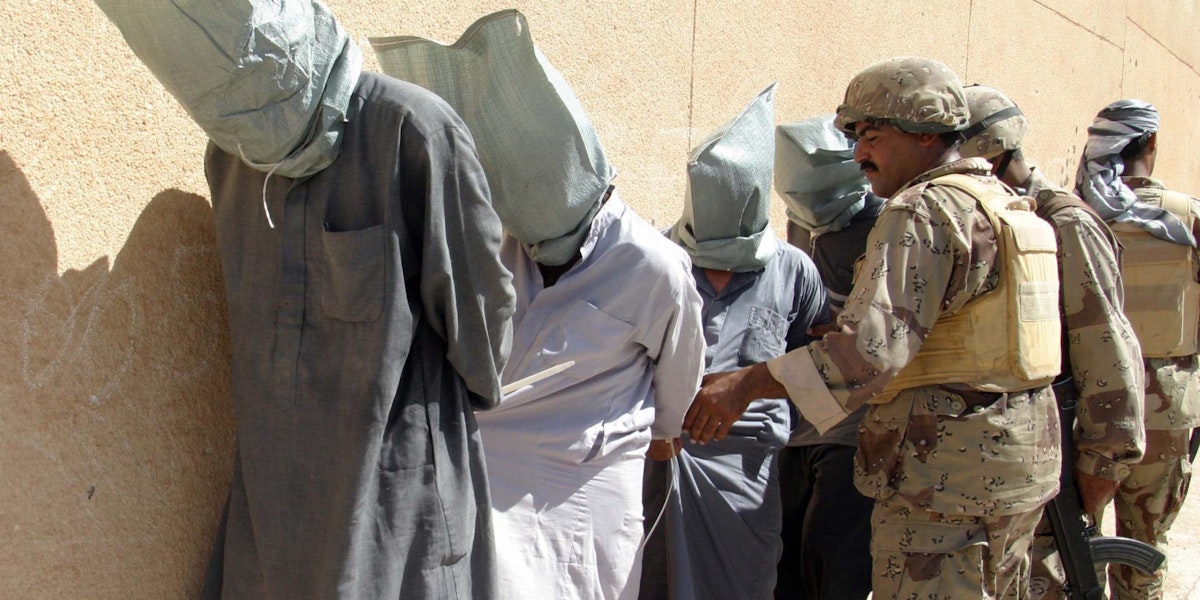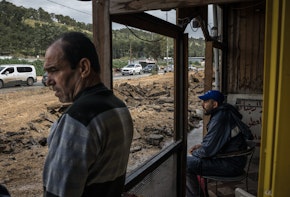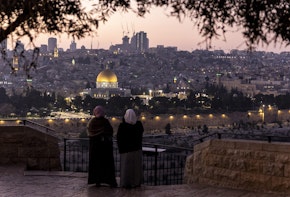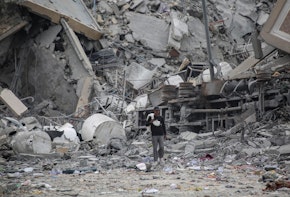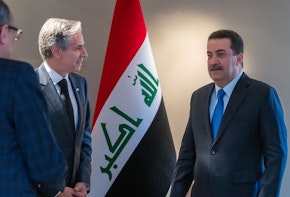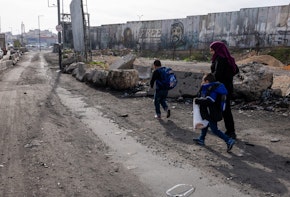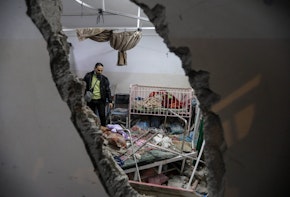Table of Contents
-
- Predictable Disaster
- America Misses the Big Picture
- Misplaced Iraqi Exceptionalism
- Narratives of Sectarian Victimhood
- Poisoning Arab Politics
- International Rules, for Some
- Change, but at a Glacial Pace
- A Zombie State
- Earthquakes, Literal and Figurative
- Democracy Needs Accountability
- No Consent of the Governed
- Facing Painful Truths
- False Humanitarian Imperative
- What about the Oil?
- Time to Apologize
Twenty years ago, the United States invaded Iraq on the false pretenses that Saddam Hussein threatened the world with weapons of mass destruction and supposedly played a role in the 9/11 attacks. America disastrously mishandled its occupation of Iraq, establishing a system of ethno-sectarian power-sharing that they handed to leaders selected for loyalty or communal authority, not competence.
Normally, anniversaries invite nostalgia. Policy experts rehash long-running ideological debates about their competing approaches to world affairs, while officials try to cleanse their reputations or tout achievements. Today, however, we are just beginning to apprehend the deluge of terrible consequences loosed by America’s war of choice in Iraq. One generation after “shock and awe,” we are living in a world order forged by the U.S. invasion of Iraq.
From the collapse of the Arab state system to the maximalist overreach of great powers, most of today’s armed conflicts, great and small, owe a grisly debt to the Iraq invasion’s blueprint, with its spurious casus belli, hollow “coalition of the willing,” indifference to human life and international law, and careless execution. How did the events of 2003 shape our world today, and what lessons can we salvage for the future? Century International fellows and contributors tally the damage—and the prospects for repair.
 Predictable Disaster
Predictable Disaster
Fanar Haddad
The catastrophic consequences of 2003 were predicted (in nature if not always in detail) well ahead of April of that year, when Saddam’s regime collapsed. War planners and other cheerleaders of regime change displayed a staggeringly callous disregard for the fate of Iraq and its people.
That the prophets of regime change have shown no remorse and have paid no price for what they have put Iraq through over the last two decades merely compounds the tragedy. The destruction of the Iraqi state—beginning in 1990 and continuing through the sanctions era before culminating in 2003—has yet to be reversed. What we have today is the facade of “stateness” flimsily propped up on the wreckage of the grotesque Ba’athist state.
This is a far cry from the promises peddled by proponents of regime change. Rather than creating a prosperous, Western-leaning, democratic island in the Middle East—much less starting the ripple that turns into a democratic tsunami that sweeps over the region—2003 tore Iraq apart, polarized the region, raised terrorism to unprecedented levels, and undermined confidence in the international system and in democracy.
One of the more ironic and significant consequences of 2003 is that it quickly ended up serving Iranian interests, perhaps to a greater degree than any other single event.
Iraq today has come a long way from the lowest points during the invasion and occupation, but it remains light years behind where it deserves to be. Wherever Iraq ends up, and no matter the improvements that may lie on the horizon, nothing can whitewash the material and human cost that Iraq and the Iraqi people have had to pay since 2003.
 America Misses the Big Picture
America Misses the Big Picture
Sam Heller
I’m struck sometimes, in discussions of U.S. involvement in Iraq, by the tendency of even smart, critical Americans to focus specifically on the United States’ 2003 invasion and ensuing occupation.
To be clear, this is not intended as a subtweet of my colleagues and fellow roundtable participants. It is, after all, the twentieth anniversary of the invasion; talking about it makes sense.
But my impression, from my time as an American working on Iraq and benefiting from Iraqis’ perspectives, was that, yes, the U.S. invasion and occupation was a special trauma, but also it was just part of decades and decades of violence inflicted on Iraq’s people. That unrelenting violence included the terrifying rule of Saddam’s Ba’ath Party, and the Iran–Iraq War. It also included an international sanctions regime in the 1990s that immiserated the Iraqi people—that, I’ve been told, really rewired Iraqis who endured that privation—and in which the United States, importantly, played a leading role.
I think Americans’ tendency to think of Iraq in terms of our own (disastrous, and shameful) direct intervention in 2003 and the subsequent occupation speaks, in part, to a basic asymmetry inherent to U.S. power globally. The United States wields historically unprecedented power, which we can project anywhere in the world while sitting, in relative comfort and safety, between the Atlantic and Pacific. We can destroy a country and society on the opposite side of the world and, at home, feel almost nothing.
The invasion and occupation of Iraq probably sticks with many Americans because of the United States’ especially direct, unmissable involvement—scenes of U.S. troops patrolling Baghdad’s streets, the return of flag-draped U.S. dead. As a result, I think the United States is unlikely to repeat a mistake exactly like the invasion of Iraq. Even many of the most wild-eyed, dangerous hawks in Washington have learned a little bit about what U.S. military power can plausibly achieve, and what the American public will tolerate, politically.
Yet that essential asymmetry of U.S. power still allows us to do a lot of destructive things globally that fall short of invasion and occupation—including sanctions regimes with which we can impoverish and crush whole societies with almost no effort.
As Americans, we need to remember what we did in Iraq. But we also need to keep resisting our own tendency to so casually, carelessly wreak destruction elsewhere, including in ways that look less like 2003, and more like the 1990s.
 Misplaced Iraqi Exceptionalism
Misplaced Iraqi Exceptionalism
Marsin Alshamary
One of the less-discussed repercussions of the 2003 war is that it created a sense of Iraqi exceptionalism. Because the United States imposed regime change in Iraq (and later got involved in the fight against ISIS), it created a sense among Iraqi citizens and elites that the United States, and the international community more broadly, would jump in to intervene during any crisis.
We got a sense of this during both the Tishreen movement, which began in October 2019, and the 2021 elections, when there were demands for international intervention.
On the other hand, the 2003 war also created a belief among analysts and researchers, particularly those opposed to the war, that Iraq was exceptional—that its history followed different rules than that of other nations. Because Iraq’s post-2003 system was imposed from without, and is wholly an outcome of foreign intervention, these analysts saw anything that resulted from it as being inorganic and corrupted, making it difficult to work on and with Iraq on day-to-day issues, even twenty years on. Treating Iraq with such exceptionalism has crippled the country’s agency and its ability to move forward, and has shaped its relations with regional and international powers.
 Narratives of Sectarian Victimhood
Narratives of Sectarian Victimhood
Renad Mansour
Are you Sunni or Shia? Arab or Kurd? From another minority identity group?
These were the questions asked by many journalists, policymakers, and scholars as they began in 2003 to explore the dynamics of the new Iraq. It seemed to them a foregone conclusion that these identities represented the country’s main historical fault lines. In 2006, Joe Biden (then a senator) even called for partition of the country, arguing that Iraq could only function if separated into Kurdish, Shia, and Sunni regions.
Sectarian and ethnic fault lines were less a social phenomenon than an intentional construction, built into the system by Iraq’s new leaders from Shia Islamist and Kurdish nationalist parties. Returning to Baghdad after decades away, these political leaders found no organic political constituency inside Iraq. They had to cultivate new followings and represent people about whom they knew very little. Victimhood became their currency.
These leaders instrumentalized historical harms committed in the name of religion to build imagined communities. They used clerics to secure votes. But many Iraqis began to see a different picture: an elite gutting their country of its wealth, and diverting money to private bank accounts instead of providing basic services.
Protests in Iraq, including the October 2019 Tishreen uprising, demanded an end to the ethno-sectarian power-sharing system. “We want a homeland!” was the dominant slogan of this growing movement, which was opposed to the parties that had pillaged Iraq in the name of religion—but not opposed to any religion or sect.
Iraqis have historically suffered horrifying violence and avoidable privation, including some terrible chapters of sectarian and ethnic violence and crimes against humanity. Since 2003, however, the elites responsible for most of the suffering have sought to distract from their malignance with narratives of sectarian victimhood.
For many Iraqis, the real fault line over the past twenty years has been not sect versus sect, but the elite against the people, who became the greatest victims.
 Poisoning Arab Politics
Poisoning Arab Politics
Aron Lund
Some say the Iraq War was a conflict with many losers but no winners, but that’s not true. One country clearly emerged from the bloodletting strengthened and with a renewed appetite for regional power—namely, Iran.
As far as U.S. foreign policy goes, however, the invasion of Iraq was not merely a failure and a crime, but an own goal of colossal proportions. The war empowered Washington’s arch-enemies, upended regional stability, discredited Western calls for democracy (and nonproliferation), and unleashed a tsunami of Saudi–Iranian venom and sectarianism.
When popular protest against Arab autocracy finally bloomed in 2011, the Middle East was primed for neither revolution nor reform, but for proxy conflict and sectarian warfare. To no small degree, that was a result of the Iraq War.
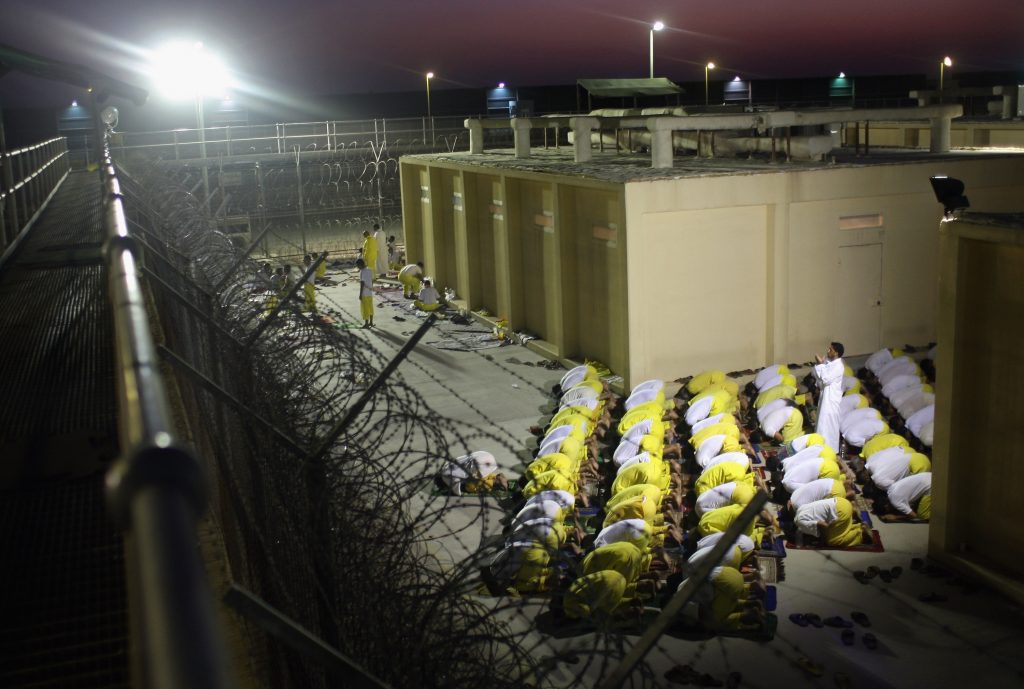
 International Rules, for Some
International Rules, for Some
Dahlia Scheindlin
The United States is supposed to be the global leader, and was one of the primary architects of the idea that nations would resolve conflicts peacefully, by taking a leading role in forming the United Nations in 1945. Since then, the United States has led some of the deepest and most controversial violations of that basic principle. The war in Kosovo, which had profound moral and humanitarian justifications, nevertheless raised deep skepticism about who had the power to violate the international system.
The Iraq War was a global turning point; even UN secretary general Kofi Annan declared that it violated the UN charter. And any system is made up of component parts and specific rules. The United States has been violating the international order for decades by enabling Israel’s occupation, although settlements and creeping annexation legitimize taking territory by force. The United States has also rewarded Morocco for its military occupation of Western Sahara, by recognizing its sovereignty there.
One of the most innovative and audacious post-World War II institutions is the concept of international justice. As others in this roundtable point out, the United States has never taken responsibility by acknowledging or apologizing for the devastation in Iraq. The lack of accountability for the Iraq War now hampers efforts to hold Russian president Vladimir Putin accountable.
International law scholar Philippe Sands, who has called for an international tribunal to try Putin for the crime of aggression, has observed: “The big elephant in the room in Ukraine is Iraq, which was also a manifestly illegal war and produced a very different response in Britain and in the United States.” When I gave a lecture to students on the evolution of the postwar rules-based order and why it exists, a young student from a large, important non-Western country raised his hand: “But hasn’t it always been a farce, just an excuse for the powerful countries to do what they want?” We all knew what he meant.
 Change, but at a Glacial Pace
Change, but at a Glacial Pace
Ali Al-Mawlawi
For many Iraqis, including myself, the fall of the Ba’ath regime heralded a moment of optimism and belief in the possibility that Iraq could finally move beyond the cycles of conflict and persecution that had blighted so much of its modern history. There was a genuine sense that the country was on the cusp of a transformative period of state-building that would secure a more equitable and peaceful future for all. Even despite the ravages of civil war and unrelenting terrorism that followed the invasion, many Iraqis hung on to the belief that it was only a matter of time before real change would materialize.
Twenty years on, what has become abundantly clear is not the futility of believing in change, but that the scale of the challenge is far greater than any of us ever imagined. Reflecting on the initial post-2003 period, there was certainly a sense of naivete about what could be achieved in the span of two decades, but most of us were by no means oblivious to the fact that so many in our region and beyond were hell-bent on ensuring that the state-building project in Iraq did not succeed.
For those of us who envisioned a new future in Iraq, coming to terms with the slow pace of change has been excruciatingly difficult. But Iraqis have demonstrated throughout the past twenty years that they are capable of defying the odds and overcoming immense challenges. The journey toward a truly prosperous and dignified country remains long and arduous, but we must continue to believe in change—if not for ourselves, then for the sake of our children.
Learn More About Century International
 A Zombie State
A Zombie State
Zeinab Shuker
At the twentieth anniversary of the U.S. invasion of Iraq, I can safely say that the country has moved from bad conditions to even worse. Before 2003, the Iraqi story was one of dictatorship, oppression, and economic hardships; but it was also a story of a new state finding its identity, especially in the 1970s, before the Iran–Iraq War.
However, Iraq’s increasing dependency on oil resources, combined with Saddam Hussein’s multiple catastrophic decisions, set the stage for post-2003 Iraq. Democratic promises and dreams turned into a power vacuum and a fractured state. Hopes for economic development turned into a kleptocratic and zombie dependency on petroleum. Diversified economic sectors gave way to environmental disasters.
Many of these terrible pathologies predate Saddam and the invasion, and continue to hobble Iraq. However, a new Iraq can still be born. With every hegemonic project of destruction, there is a counter-hegemonic project of building a new country. Such a project is taking shape today in the action of youth across Iraq who are organizing, thinking, and writing an alternative outcome for their homeland.
 Earthquakes, Literal and Figurative
Earthquakes, Literal and Figurative
Maria Fantappie
Awakened by the dislocating waves of the recent earthquake, a Syrian friend told me with a trembling voice: “We have had enough of this region.” The U.S. invasion of Iraq has been a defining event of our generation. Twenty years have passed, and I feel that many of the issues the invasion opened up remain unresolved to this day.
All of us, including those from Iraq or those like me who followed the war from a distance, still walk in the path that the invasion carved out for us all. The signposts of this path are harrowing: the crisis of the international order; the deepening gap between the West and the Global South; the manipulative abuse of values to justify war narratives; the thin boundaries between fact and falsehood; the increased securitization of our daily life; the incestuous relation between profit and war; and, most importantly, a widespread sense of injustice.
The waves of political and social instability that buffet the Middle East today originate in 2003. The invasion and its aftermath created a downward spiral of continuous relapse into conflict and crisis. The aftershocks of this descent affect not only the Middle East, but also the world.
Even the suffering unleashed by the recent earthquake is vastly worse than it would have been without the chaos caused by the Iraq War’s long fallout. Today, the time is long overdue for a new, cooperative politics and U.S. policy that prioritizes the well-being of the region’s people.
 Democracy Needs Accountability
Democracy Needs Accountability
Sajad Jiyad
If there was any hope that democracy could be the best form of governance in the Middle East, and that the United States could make Iraq an example of that, the war of 2003 destroyed much of that hope.
Every element of the 2003 war was fundamentally flawed, from the false justification, to the conceited rule by decree of a viceroy, to the disastrous military occupation. The conduct of the Iraq War, and its aftermath, was enough to disabuse any true believers in “The End of History” and the moral superiority of the United States.
The false pretenses for the war, the woeful lack of planning for governance, the continuous mistakes in dealing with security and the newly installed Iraqi political elite—and the disconnect after 2008—led many Iraqis to view regime change as a disaster. The political system the United States created in Iraq is still failing Iraqis today. The social contract is broken, and the country constantly teeters on the brink of collapse.
Iraqi agency and responsibility for what’s happened since 2003 cannot be sidelined. But surely the United States can do better than viewing Iraq as just an arena to fight Iran. Democracy, in theory, should guarantee accountability. But accountability has been in short supply, for what occurred in 2003, and after.
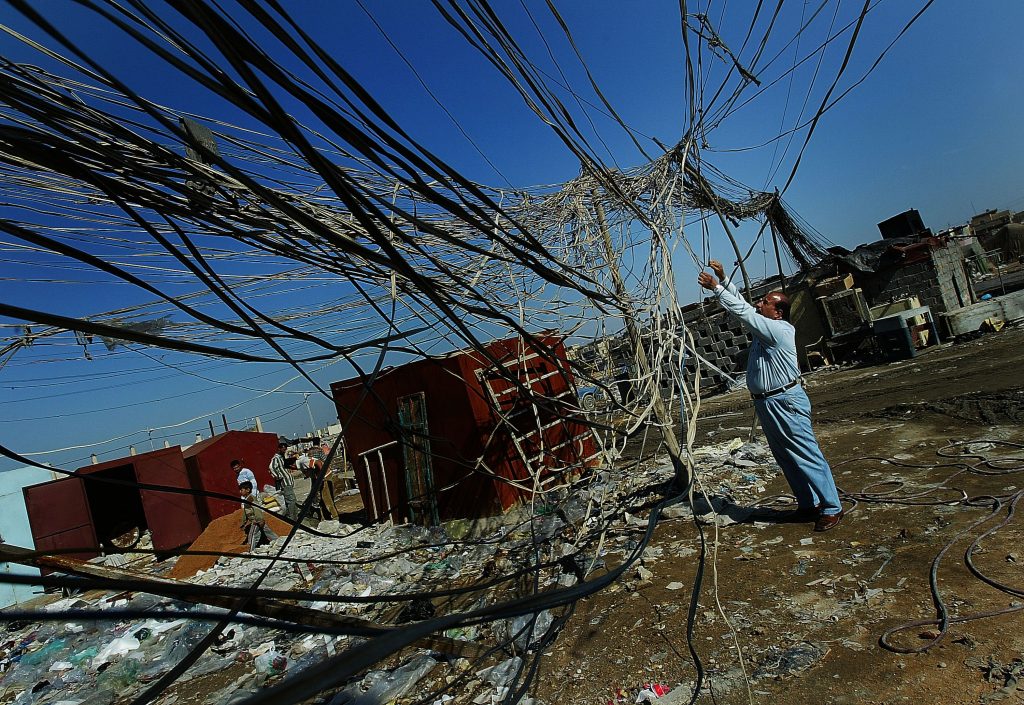
 No Consent of the Governed
No Consent of the Governed
Abdelrahman Ayyash
For a generation of Arabs and Americans alike, the U.S. invasion of Iraq marked a defining moment in history. The invasion was a U.S. venture to resolve its own problems, whether fabricated or real, rather than Iraq’s. Many people understood it then, and it’s more evident than ever now. Two decades after the post-9/11 Global War on Terror and the invasion, U.S. policymakers appear to have learned the wrong lessons. Security concerns still smother developmental ones, and popular grievances disappear in the fray of elite competition.
People in the region see a reality that is much worse than it was two decades ago. Behind the illusion of stability lies a swirl of proxy wars, impending economic crises, and a population that is increasingly disenchanted with their governments. As U.S. policymakers march toward formulating their policies toward the Middle East and North Africa (MENA) in the time of great power competition, shortsighted policies continue to reign supreme.
The U.S.-backed Abraham Accords, which normalize relations between Israel and several Arab countries, are a case in point. Instead of fostering representational politics and allowing local reforming ideas to emerge, they have imposed a new form of politics for the MENA region that was designed in the halls of the U.S. Department of State. These accords and any similar initiatives are poised to be as successful as the invasion. The United States should learn that it cannot impose its order without the buy-in of the region’s people, whether through military intervention—as it did in 2003—or through political pressure, as it has through the Abraham Accords. Instead, Washington should align its interests with the aspirations of the region’s people.
 Facing Painful Truths
Facing Painful Truths
Eamon Kircher-Allen
Americans broadly accept that the invasion of Iraq was the wrong move. A 2021 YouGov/Economist poll found that 43 percent of Americans—a plurality—thought sending troops to Iraq was “a mistake.” Other polls show shrinking support; just 27 percent of Democrats and 61 percent of Republicans said the use of military force in Iraq was the “right decision.”
But while Americans seem to mostly understand the Iraq War did not serve the national interest, it’s much less clear whether they grasp how the war was morally and legally wrong—in other words, that it was a crime. The invasion was based on lies and blatantly violated international law. Worst of all, though, the United States treated the Iraqi people as passive, imperial subjects.
American conduct in Iraq was frequently reprehensible. There were the headline-grabbing atrocities like Abu Ghraib and the 2007 massacre, by the American private security firm Blackwater, of seventeen civilians in Baghdad’s Nisour Square. Even worse, however, was the high-level decision-making. American leaders quickly lost appetite for the pompous project of bringing freedom to Iraq, and reverted to a more callous occupation that accepted rampant carnage as long as the loss of American life was minimal. Hundreds of thousands of Iraqis were killed in the conflict—a figure that, though staggering, still only hints at Iraq’s deep wounds.
If there is any hope for restoring American global leadership, Americans will have to articulate their own, honest narrative about the war. To overcome the legacy of the Iraq War, to meet the world in truth about what we did, we first need to tell our own story, to ourselves.
Over time, Americans were able to account for their crimes and mistakes in Vietnam without demonizing the soldiers who went—willingly or not—to fight in a conflict they did not instigate. We can do the same for America’s ugly record in Iraq. And for the sake of the world, we must.
 False Humanitarian Imperative
False Humanitarian Imperative
Sima Ghaddar
The 2003 U.S.-led invasion of Iraq drastically shifted how we evaluate the nature of humanitarian action and relief work in conflict zones. The U.S. occupation not only threatened the fundamental principles of international law that had typically guided humanitarian action, but also revealed how essential human rights and development nongovernmental organizations were to the doctrine of military humanitarianism.
Prior to the invasion, the United States made foreign aid and relief work central to its war plan. Blurred distinctions between military, political, business, and humanitarian roles made it harder to defend the humanitarian aid apparatus. In time, it became harder to explain how the UN system was separate from the occupying power, with whom it worked closely.
In Iraq, the United States fashioned strategies that forced humanitarians into compliance and complicity with occupying and ruling regimes. Such strategies depended on aggressive security postures and deterrence instead of acceptance and embedded aid networks; they rested on excluding populations, categorizing people, and doing more harm, all under the mantra of do less harm.
The entwining of humanitarian organizations with the invasion and occupation has made it more difficult to argue a humanitarian imperative in any other country of the world since. Sometimes, that’s a benefit—it has become harder to abuse humanitarian values to justify military adventurism. Just as often, though, it’s an obstacle, as even well-founded humanitarian motivations for action have become suspect.
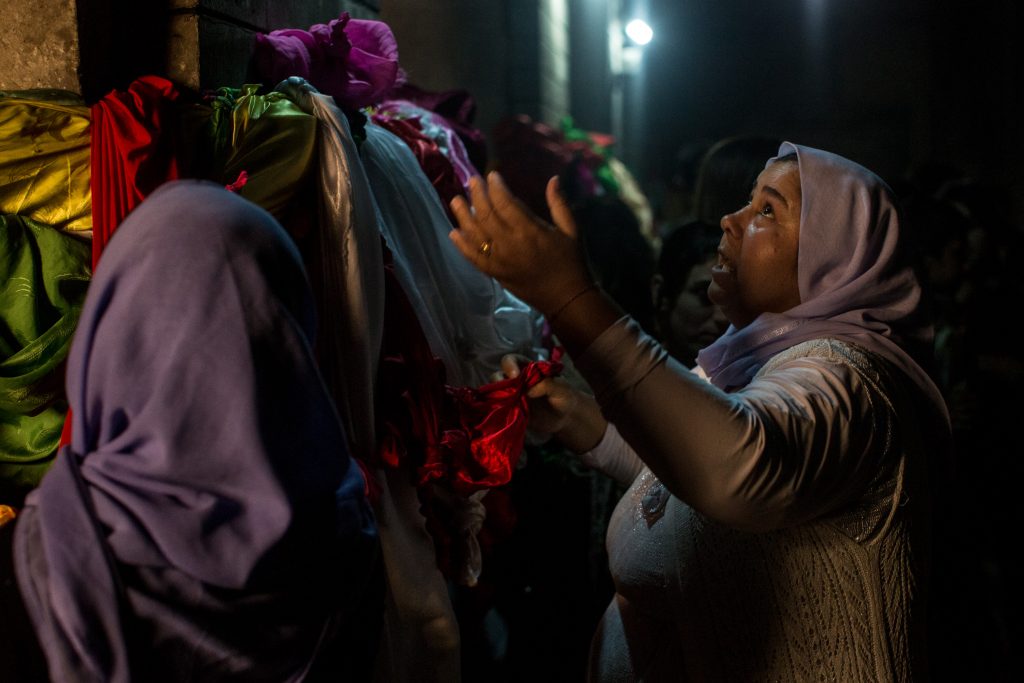
 What about the Oil?
What about the Oil?
Zachary Cuyler
Claims that the United States invaded Iraq “for the oil” have become a sort of anti-imperialist folk wisdom, as Iraq’s massive oil wealth seemingly renders any other explanation absurd. Donald Trump flipped this logic, declaring that the United States should have taken Iraq’s oil as war booty.
Such crude reasoning has made it difficult to have a serious discussion of the ways in which oil really was a major motive for the invasion. In the early 2000s, U.S. policymakers believed that “peak oil” was near, and that Iraq held much of the world’s remaining reserves. Removing Saddam and privatizing Iraq’s petroleum sector was supposed to allow private capital to boost global supply without feeding Iraqi militarism. Revitalizing and liberalizing the Iraqi oil industry would have the added benefit of undermining the Organization of the Petroleum Exporting Countries (OPEC).
This plan did not work as its architects expected. Iraq only began granting contracts to international firms in 2009 under a mixed public-private system. Iraq did not quit OPEC, although it often overproduces to meet recurring fiscal deficits. And thanks to fracking and other innovations, the world will face climate catastrophe before it runs out of petroleum.
The United States did not invade Iraq to take its oil, whatever that would mean in practice. But the United States did have a plan to change the way Iraq managed its oil reserves and brought them to market—a plan that was intended to advance U.S. interests. The Bush administration aimed to open Iraq’s resources to private investment. That the maximalist version of this project failed—and that the mirage of peak oil dissipated—doesn’t change oil’s centrality to this war of aggression.
 Time to Apologize
Time to Apologize
Thanassis Cambanis
American leaders were taken aback last year when they canvassed for support to join the coalition to help Ukraine resist the Russian invasion.
They should not have been surprised by the prickly reaction. Governments around the world, like their citizens, still remember 2003 and, to date, have detected no American regret or interest in repairing the harm the United States caused that year to the international order.
The United States had preserved a reputation as a guarantor of an international liberal order that, on balance, promoted rights, law, and opportunity—despite an ambiguous record and some deplorable behavior.
But in a few short months after 9/11, the United States squandered much of the moral capital it had accrued during the Cold War and its aftermath. The world’s lone superpower at the time brazenly lied to its own public and the international community, and proceeded to visit untold suffering on millions of Iraqis. Over the following decade, the U.S. record in Iraq was inhumane, incompetent, and consequential.
By destroying Iraq’s institutions, the United States catalyzed a speedy collapse of the Arab state system. By discarding norms and any remaining fealty to international law, the United States ensured there would be no restraints on imperial misbehavior by major powers in the emerging new multipolar order.
Now the United States wants to lead a revival of liberal internationalism. To make a credible start, Washington will need to finally reckon with its abominable record in Iraq. The United States can start by apologizing to Iraqis for the harm caused, and correcting the official record—a necessary but politically difficult step.
Countries in the Middle East and the Global South are rightfully suspicious when they hear American officials deplore Putin’s invasion of Ukraine. Rights and accountability must apply to all, or none. Today’s global disorder blossomed in Iraq; a revival of international comity must begin with an honest American appraisal of its misdeeds in Iraq—and a sincere apology.
